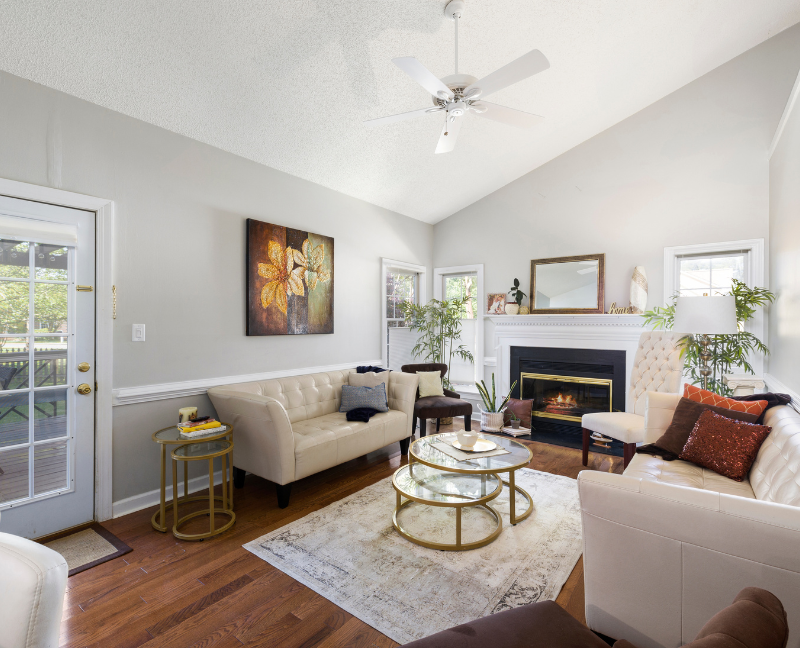The American Dream has long included homeownership, which is one of the major expenses most individuals hope to make in their lifetime. Demand rises as more people rush to buy new homes in the housing market when property prices and interest rates fall.
One group of people, however, isn't too excited at aiming for the milestone of homeownership even in the current presence of cheap interest rates. More Millennials are putting off buying their first house.
In this article, we'll find out the various reasons that are keeping this group from buying their properties.
Generally speaking, a homeowner's monthly gross income should not be more than 25% of their mortgage payment. Anything higher implies they cannot afford the house. That being said, it might be more difficult for millennials to purchase a property as the affordability gap between home values and income levels develops.
This might be one of the biggest reasons why millennials can't buy homes.
The National Association of Realtors (NAR) reports that in January 2020, the housing affordability index again exceeded 100. The index value dropped as low as 92.5 in 2018 from a high of 109.3 in 2015. An index value of 100 indicates that a family making the median income has exactly enough money to be approved for a property costing the median price. There are parts of the country that are more affordable because the index represents an average across the U.S. The issue is whether Millennials are prepared to move and part ways with their jobs, friends, and families to purchase a property.
Compared to 1967, when 80% of adults aged 25 to 34 shared a home with a spouse or partner, less than 60% did so in 2018. People are now getting married later, with the average marriage age for women being 27.8 and for men being 29.8 as per 2018 U.S. statistics. Counting Houses.
The Centers for Disease Control (CDC) reports that the average age of a first-time mother is 26, while this age rises for urban and college-educated women. Due to the evolving nature of marriage and parenthood, Millennials are delaying the purchase of their first house and living at home with their families for extended periods.
A survey conducted by the Bank Of Millennials on the purchasing trends of Millennials suggests that "life events like getting married or having kids are typical triggers to buying a home. The longer this age group lives with parents or independently, the more homeownership will be delayed."
The share of Millennials living at home or with family has increased by nine percentage points since 2005, to 22.5%, in part due to delayed childbearing and later marriage.
More than 50% of homebuyers under the age of 36, according to NAR, claimed that student loan debt prevented them from purchasing a home. According to an estimate from Apartment List, college graduates in 2018 who had no student debt needed to save for a 20% down payment in 7.6 years, whereas those who had debt needed to save for more than four years longer.
By the beginning of 2020, student debt in the United States had reached almost $1.6 trillion. As a result, it has now become a hardship for Millennials who are trying to enter the home market. The same group is also struggling with low incomes and raises in the majority of the job market, which makes it harder for them to repay their debt. The purchase of a house was delayed by student loan debt for more than 50% of buyers under the age of 36, according to NAR. According to Apartment List, college graduates with student debt were required to save more than four years longer than those without debt in 2018, needing 7.6 years to accumulate a 20% down payment.

To lower risk, banks tightened credit underwriting. They also doubled down on the requirement that homebuyers put 20% down. However, Millennials are taking longer to save up enough money to put a down payment on a home as prices rise.
The majority of the current 25 to 34-year-old generation began their careers during the financial crisis and the early stages of the recovery, when the economy and job market were shaky, according to Bank of America.
Even though lenders may offer loans with less than 20% down payments through mortgage affordability programs, lenders frequently charge higher interest rates on these loans to make up for the higher default risk. The majority of these mortgages will also demand that Millennials purchase private mortgage insurance (PMI), which would raise monthly payments even further.
Millennials are still moving in huge numbers to urban areas. According to a 2018 Pew Research study, 88% of Millennials currently reside in urban regions. Millennials are relocating to areas where there are more renters than homeowners, driving up rental prices in the urban areas where they choose to live, whether it's due to a social movement or the allure of better job possibilities. Millennials don't seem to want to own a backyard or even commute thus far. BuildZoom claims that while new home sales are above 2000 levels within five miles of the cores of the ten densest cities, they are around 50% below 2000 levels ten miles outside of the city.
The purchasing habits of Millennials in big cities, such as their love of new clothing, Amazon Prime, the newest smartphones, and daily Starbucks trips, have received a lot of attention. Data from the Bureau of Labor Statistics (BLS) however, somewhat refutes this idea. Between 2004 and 2015, spending on clothing and entertainment dropped 1.4%. Spending on privately owned housing fell 2.6%, which was the greatest decline in Millennials' shopping baskets. During this time, the 3.2% increase in rental housing costs was the biggest.
While Millennials are delaying homeownership due to rising home prices in the US, evidence suggests that it may not be entirely out of their price range. The average age of Millennials who are still living at home has increased, even if some financial barriers—student loan debt and down payments—remain. These societal changes in how young adults are living have driven homeownership to record low levels.
It's more critical than ever for your house to stand out in the current market. Making an effort with the "packaging" will result in a stronger first impression, which generates more offers and speeds up the sale. It is the main goal of house staging.
As home stagers, we draw attention to a home's best features so that potential buyers see them right away while also establishing a welcoming, comfortable atmosphere. Making your home as desirable as you can increases the likelihood that buyers will feel confident enough to submit an offer on it.
We've put together this beginner's guide to home staging to offer you a fast explanation of how it works, why it is so powerful, and how to use it to help sell your home if you're new to it or have questions about how it all works.
Understanding your customer is essential before trying to sell anything.
It's the same when selling a house. Indeed, most people's purchase of a home represents the largest purchase they will ever make, so several considerations influence their choice.
The idea behind home staging is the same as that used by product creators, who spend a lot of time, money, and effort packaging their goods in a way that appeals to customers.
Consider yourself the prospective homeowner. They are under a lot of pressure to spend their money wisely and are looking at a ton of residences.
In addition to practical considerations, there are a lot of emotional ones as well. House staging goes beyond simply displaying a home's advantages and makes it seem like home, allowing purchasers to form an emotional connection and feel secure in their financial decision.
You want a buyer to focus on the advantages of your house.
Family photos, personalized decor, and clutter are all major distractions.
Though it would be ideal if purchasers could see past these issues, the majority of them can't.
Family photos make most buyers uncomfortable because they remind them that they are walking through someone else's private home, clutter makes homes feel small and claustrophobic, and personalized decor can be off-putting if the buyers don't share the same tastes (and makes them think they must invest a lot of money to change it), and personalized decor can be off-putting if the buyers don't share the same aesthetic preferences.
All three of these problems are addressed by home staging. You should start by organizing the entire house. Get rid of everything you don't want (give it or toss it away), then pack the rest away. More so than you would if you were planning on relocating there. The home will feel bigger and more open if there are fewer things about it.
Then, make the décor and color scheme neutral. Get rid of any wallpaper, vividly colored walls, and esthetically distinctive decor. To appeal to the most buyers possible, you should maintain a neutral color scheme and a modern design while staging a home. Just a few bright elements will give it some personality. Buyers will be able to see the house in a lovely light and have the freedom to envision their own decor in its place as a result.
Remove all of your personal belongings, including jewelry, toiletries, and photographs.
You want potential purchasers to consider the house as their own, not someone else's.

Take care of any necessary repairs before listing your house for sale.
While it may be tempting to pass on minor or even major repairs to the new owner, most house purchasers will see dollar signs and either remove the item from their offer or move on to the next move-in-ready home.
Before beginning to show your home, make sure you thoroughly clean it. We advise hiring specialized cleaners who will use the best tools to reach every nook and corner. After that, continue to maintain it while it is for sale.
It's time to add some unique touches after you've finished all the repairs, cleaned and decluttered, neutralized the color scheme, and de-personalized the decor.
If you've ever visited a model house, you may have seen items like a coffee machine and a set of cups on a tray in the master bedroom or a pair of white robes hanging in the restroom.
These items have a significant influence on a buyer's mentality, therefore they aren't only there for entertainment. Use a handful of these extraneous elements to make customers happy and make them feel like they've found something special.
Do you have other tips when staging a home? If yes, feel free to drop them in the comments.
Thank you!
A home purchase is not the same as signing a lease. Often, you sign a one-year lease when you rent a place.
If you want to avoid losing money on your property when you purchase a home and obtain a mortgage, you should be ready to commit for at least five years at a time. It turns out that the five-year commitment to homeownership offers many emotional and psychological advantages in addition to financial advantages.
So before you look for just listed homes for sale, here are the top 5 benefits you should consider:
A home purchase is not a quick investment. It is expensive to stay in a property for a period that is less than five years; most people plan to stay in their homes for ten to twenty years, and it's usually because of the up-front purchasing, closing, and mortgage fees. When you purchase a home with that goal in mind, you're more inclined to make investments in your neighborhood and property. You'll make an effort to get along with your neighbors better, volunteer, and take an active role in resolving issues when they arise.
Humans are social organisms that require close-knit networks to survive. Civic engagement, which is inherently motivated when you own a property, is the best method to cultivate these networks.
You'll experience less stress as a homeowner as long as your mortgage is manageable given your current financial circumstances.
Here are some of the reasons why:
According to studies, kids of homeowners typically do 9% higher in Math and 7% better in reading than kids of non-homeowners. Experts attribute that to the stability that homeownership brings to these kids' lives. Children thrive on regularity, so when they know what to anticipate, connect with the same friends, and experience the same environment—like your neighborhood—they feel less stress, and when they feel less stress, they perform better in school.

Who doesn't want their child or children to act more appropriately? According to studies, children of homeowners experience 1-3% fewer behavioral issues than children of renters. The stability that the young ones experience when their parents own their home as opposed to the potential unpredictability that comes with renting is what the researchers attribute their findings to. Researchers have found a link between parents' happiness and their kids' happiness, so if you're less stressed, your kids' stress levels will be too.
Renting generally means residing in someone else's house. As a result, not all elements of your surroundings are under your control. You have no control over, for instance, the chemicals your landlord puts on the apartment's landscaping or the materials they choose to use inside. Moreover, most landlords don't keep up with termites, rodents, or mold issues.
But, you have total authority over every choice made about your property when you own your own house. You can choose non-toxic building supplies and fertilizer, take care of bugs and mold, and other issues before they become a problem. You may create the kind of healthful environment you want in your house.
Although the financial advantages of homeownership are occasionally contested, they are widely established. You may not have thought about the emotional and psychological advantages of having a secure living situation, such as a fixed mortgage payment and the ability to completely manage your surroundings, that comes with home ownership.
These benefits might be more significant than any tax deductions or monetary gain you might experience.
If you're ready to begin your journey to owning your home or learn more about this process, our team at RE/MAX Advanced Realty is happy to help!
Give us a call at 317-298-0961 today!
Not only is buying a home exhilarating, but it's also one of life's greatest accomplishments. There are many advantages to having your own property, even though it might be difficult at some point.
Renting, on the other hand, can be a terrific short-term option for deciding where you want to live and for accumulating funds for your down payment on a home loan.
So, which one should you choose?
In this post, we’ll help you decide whether having a home or renting out is for you.
There are several benefits of renting a home, some of which include:
Flexibility: Renting a home offers a great deal of flexibility as you are not tied down to a long-term commitment. Most rental agreements are for a fixed period, after which you have the option to renew or move to another location. This makes renting a great option for those who frequently change jobs or move frequently.
Lower Upfront Costs: Renting a home requires a lower upfront cost compared to buying a home. You typically only need to pay a security deposit and the first month's rent, whereas buying a home requires a down payment, closing costs, and other expenses.
No Maintenance Costs: When you rent a home, the landlord or property manager is responsible for any maintenance and repairs. This means that you don't have to worry about unexpected expenses related to repairs, which can be a significant benefit.
Access To Amenities: Many rental communities offer access to amenities such as swimming pools, fitness centers, and laundry facilities. This can be a great perk for those who want to enjoy these amenities without having to pay for them separately.
No Property Taxes: As a renter, you are not responsible for paying property taxes. This can be a significant benefit as property taxes can be a significant expense for homeowners.
No Need To Worry About Resale Value: When you rent a home, you don't have to worry about the resale value of the property. This can be a great benefit if you are not interested in investing in real estate or if you don't want to deal with the stress of selling a property.

Increasing Equity: The value of the property you own represents your equity. When you pay off your mortgage or when the market value of your property rises, equity might naturally increase. Making additional mortgage payments can also help it grow.
If you've made additional payments to your loan, you may be able to redraw it or refinance for a cash-out. The money can then be utilized for remodeling, purchasing a new vehicle, or even as a down payment for a different home.
Living Security: The landlord, who may decide they no longer wish to rent out their property, is in charge of your position when you rent. Relocating is expensive, inconvenient, and emotional, to say nothing of all three. When you own your own house, you can rest easy knowing that you get to choose when to relocate.
Build The Home Of Your Dream: You can opt to completely redo the bathroom with a jungle theme or to paint the walls in vibrant colors without worrying about getting your bond back when you own your own property, giving you total creative freedom. House upgrades can raise a property's value, thus every dollar that your house has appreciated will be yours if you decide to sell. Get our guide to getting your home renovation off the ground.
Cost Management: Your rent may be increased regularly if you rent. While owning a home entails a variety of costs, including mortgage payments, council fees, and strata or property insurance, these costs are not likely to increase significantly overnight.
By selecting a fixed-rate home loan, you might in some cases even be able to keep your rates under control.
Save Cash: Although it may not seem like it, you might save money by making your mortgage payments. Many repayments combine principle and interest, allowing you to contribute some funds to expanding your home's ownership. Although renting could appear to be less expensive, you won't eventually get any of that value back.
Nonetheless, it has its own pros and cons. If you want to learn more about it, feel free to click this link or subscribe to our mailing list.
Thank you!
Being a first-time home buyer can be exciting. It gives you the flexibility to decorate and refurbish any way you choose, the opportunity to get away from the controlling landlord you've been living with for years.
But before you go on the journey to become a first-time home buyer, there are many things you should be aware of. The real estate market may be complicated and cutthroat. How much should you put aside a down payment on a first home? What are grants for first-time home buyers? Do first-time homeowners have to pay stamp duty?
This article will give some helpful guidelines for first-time buyers to consider before purchasing a home.
When trying to get your deposit savings on track, you might want to take the following factors into account:

First-time home buyers must consider more than their deposit. The following costs must be considered when buying a home, regardless of how much you need to save for a deposit:
FHOGs, or first-home owner grants, can assist you in crossing the finish line and purchasing your first house. For those planning to buy their first home, the local state or territory government may give financial support through a first-home owner's grant. Each territory and state has a slightly different set of policies.
Finding the right property is essential, but so is locating the right first-home loan. However, selecting the best loan may involve more factors than the interest rate.
Many sellers prefer auctions to private sales, so you should be confident to identify and buy your first dream property. Online or in-person auctions are a common way to sell the property. It would be an excellent view to comprehend how they operate and what you'll need to know before bidding, given the thrill of the bidding contest.
Buying a home is a huge decision, making it a lot more intimidating if you’re a first time home buyer. In our previous articles, we’ve discussed the basic things, such as the questions you should ask yourself before buying a property and the daunting process of purchasing a home.
Now, we’re going to talk about the things that come after the buying process. As a first time home buyer, this ultimate guide to buying a home will definitely help to avoid feeling overwhelmed.
A first-time home buyer is someone who matches any of the following criteria, according to the U.S. Department of Housing and Urban Development (HUD):
The deal is now closed and you can now move to your new home. The daunting part of buying a property is now over, or so it seems.
There are still a few things to consider to make your experience as a new homeowner worthwhile.
Even when you’re done with the daunting process of buying a home, saving money should never stop. Being a homeowner entails significant unforeseen costs, such as fixing the gutters or purchasing a new water heater. Create a home emergency fund so you won't be caught off guard when these expenses eventually come up.
Consider your property as an investment; therefore, you should be sure to take exceptional care of it. Regular maintenance enables problems to be repaired when they are small and manageable, lowering your repair expenses.

Unless you decide to sell it, it doesn't matter how much your house is currently worth. The main factor in determining whether you will realize a healthy return on your investment is your ability to select when you sell your property, as opposed to being compelled to do so because of a job transfer or financial hardship.
Even if you already own a property, you still need to keep funding your retirement savings. There’s no guarantee that you’ll get financial success when you sell your property even if you see people making billions when the prices of homes increase due to the huge demand.
Keep in mind that the money you used to pay your mortgage each month can be utilized to cover some of your living and medical expenses in retirement if you plan to use your home as a source of wealth in your golden years.
Buying a home is a stressful yet fulfilling process. It won’t be easy even with all the tips you get online; however, this guide will help you not only find the home of your dreams but also a home you can afford.
In the first part, we’ve shared the top six (6) questions you can ask yourself when buying a home; now, we’re going to dive deeper into the process of purchasing a property.
This ultimate guide to buying a home will help you whether you’re a first-time home buyer or not.
Feel free to browse our website to learn more tips on home buying and selling.
Now that you've made the commitment, let's examine what to anticipate from the actual home purchasing process. There are numerous bids and counteroffers flying about right now, which is hectic. You can, however, get through the procedure with your sanity more-or-less intact if you are ready for the inconvenience (and the paperwork). The general progression that you might anticipate is as follows:
Use all of the resources at your disposal to identify homes for sale, including your real estate agent, internet listing search engines, and driving around the areas you're interested in looking for for-sale signs. Additionally, make some inquiries of your loved ones, coworkers, and business associates. You never know where an excellent lead or reference for a house might appear.
If you're truly looking to buy a house, never show up at an open house without a realtor (or at the very least, be ready to give the name of someone you're apparently working with). It is clear why negotiating with the seller's agent first rather than your own agency may not be in your best interests.
If money is tight, search for houses whose potential hasn't yet been fully fulfilled. If you want to move into a house you can afford, it can be worth it to put up with the ugly bathroom wallpaper for a time even if you can't afford to replace it right away. Don't allow cosmetic flaws to prevent you from purchasing a property if the location, size, and other important factors (the big things that are hard to improve) are all satisfactory.
In order to increase their equity and move up the housing ladder, first-time buyers should look for a home they can add value to.

Your own money should be in good shape, so make that a priority. In general, having solid credit, a history of on-time bill payments, and a maximum debt-to-income ratio of 43% are requirements for being eligible for a home loan.
These days, lenders want to keep housing costs (principal, interest, taxes, and homeowner's insurance) to around 28% of borrowers' gross monthly income, though this percentage might vary greatly depending on the local real estate market.
The lender will check all of the provided financial information once you've selected one and submitted an application (calculating debt-to-income ratios, looking at credit scores, verifying employment history, etc.). A specified sum may be preapproved for the borrower by the lender. Be aware that if you do any actions that could lower your credit score, such as financing a car purchase, your loan could be canceled at the last minute even though you have been preapproved for a mortgage.
When looking for a pre-approval or a mortgage, don't be confined by allegiance to your present financial institution: shop around, even if you only qualify for one sort of loan. Rates of interest on mortgages and fees can both be shockingly different (which, of course, have a major impact on the total price you pay for your home).
A backup lender is also advised by some authorities. There is no assurance that a loan you qualify for will ultimately be funded because underwriting standards can change, lenders' analyses of risk can vary, and investor markets might change. When clients sign loan and escrow paperwork, there are instances where they are informed 24 to 48 hours prior to the closing that the lender has frozen funds on their loan program. A second lender who has previously approved you for a mortgage gives you a backup plan to keep things moving along at a reasonable pace.
Your real estate agent will offer advice on how much to offer for the home as well as any restrictions you might want to include, such as having the buyer cover your closing fees. The seller will either accept your offer or make a counteroffer once your agent presents it to the seller's agent. After then, you have the option of accepting or continuing to negotiate until you reach an agreement or decide to give up.
Review your budget once again before submitting your bid. This is the time to take into account estimated closing costs, which can range from 2% to 5% of the purchase price, travel expenses, and any necessary immediate repairs or appliances before you can move in.
Additionally, plan ahead because it is simple to be caught off guard by higher or unexpected utility bills, property taxes, or neighborhood association dues, particularly if you're leaving a rental or apartment arrangement where you haven't dealt with these issues before. You might ask for the water and energy bills from the previous year to get a sense of the typical monthly expenditure.
Once you and the other party have come to an agreement, the process enters escrow once you have made a good faith deposit. Escrow is a brief time frame (typically around 30 days) during which the seller removes the home from the market with the legally binding assumption that you would purchase the home, assuming you don't discover any significant issues with it during your inspection.
There is no alternative for having a qualified professional check your possible new home for the quality, safety, and general condition, even if the house you intend to buy appears to be flawless. You should typically be allowed to withdraw your offer and receive a refund of your deposit if the house inspection reveals significant flaws that the seller failed to disclose. Other choices, if you find yourself in this circumstance, include bargaining with the seller to make the repairs or reduce the asking price.
You should be ready to close if you can reach an agreement with the seller or, even better, if the inspection turned up no major issues. The process of closing basically entails signing a ton of paperwork quickly and praying that nothing goes through at the eleventh hour.
In the final stages of your purchase, you may have to deal with and pay for things like having the house appraised (mortgage companies need this to secure their interest in the house), conducting a title search to ensure that only the seller is the rightful owner, obtaining private mortgage insurance or a piggyback loan if your down payment is less than 20%, and having completed the required home loan documentation.
The task of purchasing a property can be extremely difficult, whether you've done it before or not. The temptation is to either settle for the first house that fits your budget or to keep renting.
In this post, we’ll explore what you should think about before you buy, what to expect from the actual buying process, and some practical advice to make life easier once you move into your home to help you demystify the process and make the most of this purchase.
This will help you navigate the difficult process of getting started, setting a budget for a home, looking for one, inspecting it, understanding the fundamentals of buying, and obtaining a mortgage.
Your long-term goals are the first thing you need to decide. After then, think about how owning a home fits into those plans. Some people simply want to convert all those "wasted" rent payments into mortgage payments that result in equity. Others appreciate the thought of being their own landlord and view homeownership as a symbol of their independence. Then there is the problem of considering home ownership as an investment.
You can move in the right direction by focusing on a smaller range of your long-term homeownership objectives.
A classic single-family home, a townhouse, a condominium, a co-operative, or a multi-family complex with two to four units are all possibilities when buying a residential property. Depending on your ambitions for homeownership, every choice has advantages and disadvantages.
You must decide which kind of property will enable you to accomplish those objectives. By selecting a fixer-upper, you can also reduce the cost of your purchase in any category (although the amount of time, sweat equity, and money involved to turn a fixer-upper into your dream home might be much more than you bargained for).
You're making what may be the largest purchase of your life; while it's wise to keep some flexibility in your list, you still deserve to have it as near to your needs and wants as possible.
Your wish list should cover everything from the most fundamental considerations, such as neighborhood and size, to more specifics, such as bathroom design and the presence of reliable appliances in the kitchen. To find a new house that meets your needs and preferences, real estate websites can be an invaluable resource.
Knowing how much a lender will actually loan you to buy your first house is vital to know before you start looking. You might believe you can afford a $300,000 home, but lenders might only think you qualify for a $200,000 mortgage, depending on things like your overall debt load, your monthly salary, and how long you've had your current employment.
Before making an offer on a home, make sure to get pre-approved for financing. A lack of a mortgage pre-approval will frequently prevent sellers from even considering an offer. Furthermore, a lot of real estate agents won't waste their time talking to clients who haven't made it clear how much they can spend. Compare loan rates and costs for lenders as you start your search. After that, submit your mortgage application along with any supplemental materials your lender may need to confirm your debt and income.

But occasionally a bank will provide you with a loan for a home that is more expensive than you actually wish to pay for. You shouldn't borrow $300,000 just because a bank says it will unless you really need to. Many first-time homebuyers make this error and end up "house-poor," which means that after paying their monthly mortgage payment, they have little money left over to cover other expenses like clothing, electricity, vacations, entertainment, or even food.
You should consider the entire cost of the house when choosing the size of the loan, not simply the monthly payment. The amount of homeowners insurance you'll need to buy, the amount you'll have to spend on upkeep or improvements to the house, the number of closing expenses, and the amount of property taxes in your preferred neighborhood are all things to take into account.
Your down payment (3.5%–20% of the purchase price) and closing expenses will need a large upfront cash outlay, even if you qualify for a sizable mortgage.
One of the major obstacles when it comes to investing with a short-term objective in mind—buying a house—is maintaining assets in a reachable, reasonably secure vehicle that yet offers a return. A certificate of deposit (CD) might be an excellent choice if you have between one and three years to reach your goal. You won't get wealthy, but you won't lose any money either.
Buying short-term bonds or a fixed-income portfolio may be thought of in the same way; they will provide some growth while also shielding you from the volatile stock market.
You will want to keep the money liquid if you plan to buy a house within the next six to twelve months. The ideal solution might be a high-yield savings account. If the bank fails, you will still be able to access your funds up to $250,000 if it is FDIC insured.
Your needs and your budget will be taken into account while a real estate agent helps you find properties. They'll then meet with you to show you those houses. These experts can help you with all aspects of the home-buying process after you've decided on a house to buy, including making an offer, obtaining financing, and filing the necessary paperwork.
Any mistakes you may run into during the process can be avoided thanks to the experience of a professional real estate agent. The majority of agents get compensated out of the sale proceeds as a commission.
These are just some of the questions you can ask yourself when buying a home. In Part 2, we’ll dive deeper into the process of buying a home.
A significant financial accomplishment and source of pride is owning a home. One important factor is that owning a property increases your equity, which significantly raises your net worth. The connection between owning a property and increasing your wealth is particularly crucial at this time of high inflation.
Here are some reasons why starting your path to homeownership now would be a good idea if you're wanting to improve your financial security.
According to a National Association of Realtors (NAR) survey, there is a sizable wealth gap between homeowners and renters, which is just one of several trends related to homeownership. It says: “the net worth of a typical homeowner is about 40 times the net worth of a renter.”
This difference indicates that acquiring a home is an essential step on the road to financial success.
The fact that homeowners accumulate equity contributes significantly to the wealth gap between owners and renters. When you own a home, your equity increases as the value of your home rises and you keep up with your monthly mortgage payments. You are not afforded the same opportunity if you rent.
One of the most dependable methods to build wealth is still to purchase a home. Making regular mortgage payments helps you increase the value of your house. Renting is not the same as paying off a mortgage, which is an investment in your financial future.
But on top of that, when your house increases in value over time, your equity in it grows even more. That significantly affects how much wealth you accumulate.
Over time, increasing your home's equity can help you become wealthier. One of the few assets with the potential to gain value as you make payments on it is a home.
This means that when you buy a property, you benefit from the fact that your mortgage payment serves as a contribution to a forced savings account that increases in value together with your home. Any equity you have accrued also goes back to you when you sell. Renters never get their money back from their monthly rent payments.
If that’s not enough, below are more benefits to owning a home.
Homeowners have a solid monthly payment structure thanks to the 30-year fixed-rate mortgage. The days of dreading receiving letters from your landlord increasing your rent are long gone.
A fixed-rate mortgage's principal and interest payments are fixed for the duration of the loan, however, you can reduce them by refinancing if interest rates decline over time. If you're okay with paying a higher monthly payment, you can even decide to pay off the loan sooner with a shorter term (like 15 years).
The longer you own a home, the more likely its value will rise. There’s this thing called “appreciation,” which simply refers to the likelihood that the value of your home will increase over time.
To estimate how much your home might be valued, you can use a home value estimator or browse online listings for homes for sale in your neighborhood. Additionally, you can increase the value of your house by making improvements, and many fixer-upper mortgage programs let you combine the price of those projects into a single new mortgage loan.
There are numerous ways to access equity in your house, and there are no limits or restrictions on how the money is used. This means you can utilize the fund to achieve a variety of financial objectives, such as debt consolidation, home upgrades, starting a business, or developing your real estate investment portfolio.
There are four ways to access equity in your home:
Refinancing
In a cash-out refinance, you take out a bigger loan than you presently owe and keep the cash difference. For this kind of refinance, the majority of lenders let you borrow up to 80% of the value of your house.
Mortgage Equity Loan
If you want to borrow money from the equity in your home without refinancing your current first mortgage, a home equity loan is a popular option. You would normally pay a fixed rate that is a little more than what you would with a cash-out refinance in exchange for a flat sum of money.
Home Equity Line Of Credit (HELOC)
A HELOC functions like a credit card that is backed by your house. You can pay off and re-use the credit line for a predetermined period, which typically lasts 10 years, and you only make payments on the amount you utilize.
Reverse Mortgage
With a reverse mortgage, homeowners who are 62 and beyond can transform their wealth into cash or even income. A bonus of this tailored senior program is that there is no mortgage payment due each month.
Tax Deductions
The deduction for mortgage interest is an important tax benefit of home ownership. Since home mortgage interest is tax deductible, your federal tax liability can be reduced. The most significant benefit happens early on in a 30-year fixed mortgage when the majority of your monthly payments are made to interest rather than principal.

The tax advantages of owning extend beyond the mortgage interest deduction, though. Added deductions include:
Homeowners who have better credit may also be able to avoid having issues making their monthly payments. Renters averaged 10 late payments on their credit reports compared to 6 for homeowners in the LendingTree study mentioned above.
Final Notes
These are just some benefits of owning a home, and surely it has more to offer. So the next time you think if you should rent a place or own a property, this might help you!
And if you need real estate expert tips right away, just give us a call or send us a message!
The housing market in Central Indiana was very strong in 2020, and very much in favor of Sellers. So, if you do choose to buy in 2021, be ready to pay top dollar. However, that is not necessarily a bad thing.
Yes, you will be paying more than you might have paid 2 years ago, but your home will also hold it's value. And due to the Seller's market not looking like it will change anytime soon, this also means if you buy now, the value of your home is more than likely to increase in the coming years.
If you are exploring the idea of buying a home in 2021, there are a few basic steps you can take now that will ensure you are prepared to make a strong offer when the time comes.
1) Get Pre-Approved
Pre-approval from a mortgage lender is the essential first step to buying a home. You will speak with a mortgage broker, who will gather your information and determine the price of house which you can afford.
2) Find A Realtor with Experience
Everyone knows a realtor, however, everyone should not use that realtor that they know. Ask your Realtor, even if they are a friend or even worse, a relative, to walk you through their entire plan for you when it comes to assisting you in Buying a Home.
If you feel comfortable with that and feel they are experiened enough to handle a transaction in 2021, which will require putting in a strong offer and having it chosen among other multiple offers, then that is great.
If you want a realtor who is proven and experienced, and that also has the backing of a team of more than 90 other realtors, choose a Realtor from RE/MAX Advanced Realty.
Join the thousands of satisfied clients who have used our Brokerage in Central Indiana. Below are links to where you can begin:
1) Looking for Homes on our Website that's more user friendly than Zillow!
2) Speak with a Realtor to Learn About The Home Buying Process
Be well, and we hope to speak with you soon,
-RE/MAX Advanced Realty

8313 W. 10th St
Indianapolis IN 46234
dennis@indyhomepros.com
317-316-8224